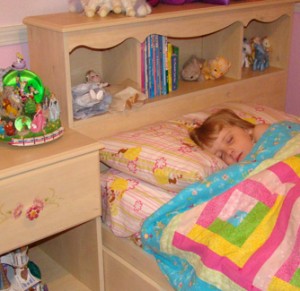How to Get Your Children to Sleep
Have your say: as we learn that getting children to bed is the most difficult part of the day, do you know any techniques for helping children get to sleep?
It’s common for parents to struggle with getting their children to go to bed and stay asleep. A survey of 2,000 parents conducted for Disney UK showed that they spend on average of 32 minutes a night – the equivalent of eight days a year - persuading children to go to bed. Parents revealed that bedtime is the most difficult part of their day, and that more than 60 per cent of have children who find excuses not to go to bed. Even after turning the lights out and saying good night, 43 per cent of parents are forced to return to their child a further three times. Night time battles to get your child to sleep are exhausting for both parents and children. So, what can be done about it? Not all advice will work for all children, but there are some techniques you can try.
Getting your child to bed: The NHS recommends implementing a bedtime routine 20 minutes before the time you expect your child to go to sleep. If you decide to bring forward your child’s bedtime, bring it forward by around 10 minutes a week until you have the desired bedtime and then try to stick to it. You might want to consider giving your child a short bath as part of the bedtime routine, lasting only five or 10 minutes, before putting them into their pyjamas and taking them into their bedroom. Try to avoid returning to the spaces they’re in during the day. This is the time for sleep. Help your child go to sleep by buying them a night light or giving them their favourite toy or comforter. If your child cries, leave them for 5 to 10 minutes before going back in and settling them down. If they are used to your staying with them while they go to sleep, you might want to try gradually withdrawing yourself each night by sitting further and further away from the bed, or promising you will return in five minutes to check on them. Make sure you do return every five minutes, so that they know they can rely on you. If none of the above works and you are beside yourself with exhaustion, you might take inspiration from parents who use sleep training and controlled crying techniques, where you essentially allow your child to settle themselves back to sleep by ignoring their cries. Many parents feel that this is unkind, so you will have to work out what works best for you and your children.
Getting your child to stay asleep: By the time your child is six months old, it is reasonable to expect them to be able to sleep through most nights. If that isn’t the case, you should try to work out why your child is waking up. An honest conversation with your child will help you see how the land lies. For example, are they regularly cold, scared of dark shapes or hungry? These are things you can attempt to correct each night with the child before they go to sleep. If there is no obvious cause, you might want to try scheduled waking. If your child wakes up at the same time every night, try gently rousing them 15 to 60 minutes before this time and then settling them back to sleep. This breaks their sleep pattern and will hopefully prevent them from waking up later. If your child cries or gets out of bed, don’t bring them downstairs or reward them with television or play time. It is important to lay your child back in bed again and again, without much to say other than "good night", until they learn that if they wake up all they will get is to be put back to sleep. Some parents find that making up a bed in the parent’s room for the child to visit in the night calms the child and saves everyone from having to get out of bed.
Have your say: What do you think? Every child is different, but do some techniques work better than others? Is there any way which you find is better than others? And is it ever OK to just let your child cry themselves back to sleep? Written By Helena Kealey Retrieved From:
|
|





















